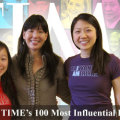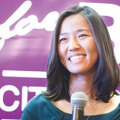TaiwaneseAmerican.org’s Margaret Chen speaks with Karin Wang, a life-long civil rights advocate who currently serves as Vice-President of Programs & Communications at the Asian Pacific American Legal Center (APALC), the nation’s largest legal and civil rights organization serving Asian American and Pacific Islander communities. We’ve followed her work for the past decade and remain impressed with all that she has been able to accomplish.
With an excellent track record of leadership, Karin has been honored by many organizations, including Lambda Legal, National Asian Pacific American Bar Association, KCET TV in Los Angeles, and the California Assembly.
TaiwaneseAmerican.org was proud to include her in our 100 Passionate People Project back in 2010. The following interview is reprinted from that web project.
Who are you?
I was born and raised in the Midwest, during a time when the “model minority” myth was pervasive and Vincent Chin’s murder was defining a generation of Asian Americans. Between my Taiwanese heritage and my childhood in a place where people thought I was Mexican (because Taiwanese or Asian did not compute), I found myself increasingly drawn to civil rights work. Like many other Taiwanese Americans my age, I started college as pre-med, but I promptly flunked an advanced chemistry quiz and realized I needed a new career path. I thought being a lawyer would let me work on issues I cared about. Ultimately, although I went to law school, I see myself as an advocate in a broader sense, using not just the law but the legislative process and the media to advance issues of social justice.
I [was a former] president of the Asian Pacific American Bar Association of Los Angeles County (APABA). In addition to APABA, I have had leadership roles in both state and national bar associations, including former chair of the California State Bar’s Standing Committee on the Delivery of Legal Services, member of the State Bar’s Justice Gap Task Force, and former co-chair of the National Asian Pacific American Bar Association’s (NAPABA) Pro Bono & Community Service Committee. I am a civil rights advocate.
What do you do?
Currently, I’m Vice-President of Programs at the Asian Pacific American Legal Center (APALC), the nation’s largest Asian American civil rights organization. My passion is working for greater social justice and ensuring that Asian Americans advance progressive ideas of justice. I started at APALC directing the immigrant rights project, focused on issues affecting immigrants who were poor and spoke little English (e.g., ensuring access to health and welfare programs; advocating for language rights). More recently, I have been very involved in advocating for marriage equality. After a series of anti-gay protests by Chinese churches in SF and LA, I helped to found API Equality-LA, a coalition seeking to increase support for marriage equality and LGBTs among Asian Americans. I believe that all social justice struggles require broad-based coalitions to succeed (e.g., allies supporting LGBTs, non-immigrants supporting immigrants). None of our communities can win our battles alone.
Why are you proud to be of Taiwanese heritage?
I am a 2nd generation Taiwanese American. My parents taught me to be proud to be Taiwanese, and as a child growing up in the 1970s and 1980s Midwest, learning to understand and appreciate my Taiwanese roots gave me my first real sense of belonging and identity in an otherwise alienating place and time. As Taiwanese immigrants who support Taiwan’s independence, my parents also instilled in me from an early age a strong sense of justice and fairness. As a young adult, those early lessons helped influenced my choice to work in American civil rights and social justice. So while I do not work specifically on Taiwanese issues, I credit my Taiwanese heritage with leading me to a career that I love and which is emotionally and intellectually fulfilling.
What does the future of Taiwanese America look like to you?
Taiwanese Americans are an amazingly talented group. We have politicians, actors, musicians, writers, lawyers, judges, activists… not just the engineers and doctors that many of us grew up thinking we had to be. We are also highly privileged — we’re mostly from middle or upper middle class families, went to good schools and colleges, have graduate degrees, have succeeded in our careers. My hope is that we (particularly the 2nd and 3rd generation) leverage our collective talents for a greater good — not just supporting Taiwanese independence (which is important) but also domestic issues here in the U.S. If we as Taiwanese really believe in the right to self-determination as well as fairness and justice, we should be supporting similar struggles in what is now the “homeland” for many of us, the U.S. Native Americans and Hawaiians are struggling for sovereignty, undocumented immigrants are struggling against racial profiling and demonization, gays and lesbians are struggling for equal treatment. I hope more Taiwanese Americans will step up and step out in the larger American society and be leaders in politics and social issues.





Leave a Reply